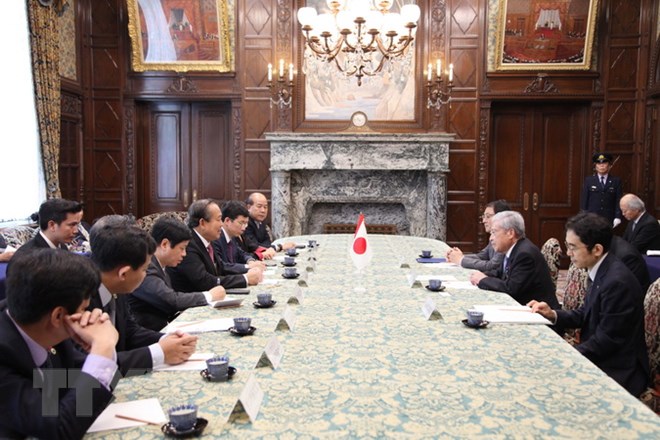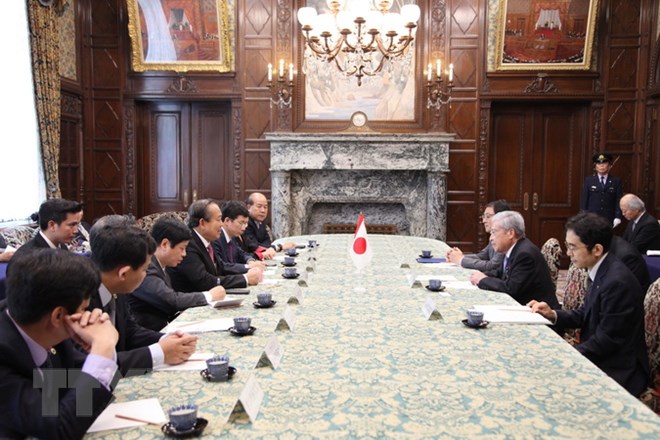
Deputy Prime Minister Truong Hoa Binh met with Chuichi Date, Speaker of the House of Councillors of the Japanese National Diet, in Tokyo on June 12 as part of his visit to Japan to attend the 24th International Conference on the Future of Asia.
Deputy Prime Minister Truong Hoa Binh
met with Chuichi Date, Speaker of the House of Councillors of
theJapaneseNational Diet, in Tokyo
on June 12. (Photo: VNA)
At the meeting, the official suggested the
House of Councillors continue the exchange of all-level delegations and expand
pragmatic cooperation with the Vietnamese legislature, while sharing experience
in building and perfecting the legal system, and judicial reform.
Binh urged the agency to support stronger economic-trade ties between Vietnam
and Japan, and the Japanese Government’s continued official development
assistance (ODA) provision for Vietnam, especially for projects on high-quality
personnel training, key infrastructure development and climate change response.
The official called for enhanced coordination between the two countries’
legislative bodies at regional and international inter-parliamentary forums.
For his part, Chuichi Date lauded achievements Vietnam has recorded in
socio-economic development and external affairs over the past time.
Noting with pleasure progresses made in the bilateral legislative ties, the
host emphasised the importance he has attached to enhancing cooperation with Vietnam across
fields.
He also showed his support for the Japanese Government to continue cooperation
with and assistance to Vietnam
in socio-economic development.
Chuichi Date said he hopes that the two sides will beef up cultural cooperation
and people-to-people exchange in 2018 when Vietnam
and Japan marks the 45th
anniversary of diplomatic ties and on the occasion of Japan’s hosting
of 2020 Summer Olympics.
The same day, Binh had a meeting with Japanese Justice Minister Yoko Kamikawa,
during which the Vietnamese official highly valued the effective cooperation of
the Government and the Justice Ministry of Japan in developing the legal system
and personnel training.
He asked the ministry to reinforce affiliation with the Vietnamese side in
judicial assistance in civil, criminal and commercial affairs.
The official proposed the early negotiation and signing of an agreement on
civil judicial assistance, experience exchange and technical support between
the two sides. He also urged the Japanese ministry to help improve capacity for
Vietnamese officials in joining and implementing conventions of The Hague
Conference.
In reply, Minister Yoko Kamikawa expressed her delight at the development of
cooperation between the two countries in general and the two justice ministries
in particular.
She called on the two ministries to soon sign a memorandum of understanding on
cooperation.
Yoko Kamikawa said her ministry is ready to closely coordinate with Vietnam at international legal forums and
conferences to which Japan
is a member, including The Hague Convention.
She called for Vietnam’s
coordination at the 14th United NationsCongress on Crime Prevention
andCriminal Justiceslated for 2020 in Tokyo,
saying Japan is willing to
help Vietnam
perfect its legal system and train personnel in the sector.
Meeting with leaders of AEON and Willer Groups, Deputy PM Binh affirmed that
the Vietnamese Government has actively improved the domestic investment
environment and created favourable conditions for Japanese investors in the
country.
He urged the two groups to expand their investment in Vietnam and
intensify their cooperation in retail, goods distribution and export, and
public transportation, helping improve local people’s living standards.
Leaders of the two groups promised to continue their long-term operation in Vietnam.
During his stay in Japan,
Binh also held talks with Indonesia’s
Vice-President Jusuf Kalla, during which the two sides agreed to boost
bilateral cooperation in economy and trade, striving to soon reach the target
of raising two-way trade to 10 billion USD.
They consented to sign deals on cooperation in trade, agriculture-fishery,
national defence, security and crime combat, and soon build a close and
effective coordination mechanism in protecting fishermen and fishing boats, and
fighting crimes at sea.
The two officials discussed measures to maintain peace, stability and security
in the region, intensify the solidarity, unity and central role of ASEAN in
strategic matters, including the East
Sea issue-
Source: VNA
According to data from the Hoa Binh Provincial Party Committee, the industrial production index for the first six months of 2025 is estimated to have increased by 20% compared to the same period last year. This marks the highest year-on-year growth rate for this period since 2020.
In the first six months of 2025, Hoa Binh province’s export turnover was estimated at 1.145 billion USD, marking an 18.11% increase compared to the same period in 2024. Import turnover was estimated at $ 804 million, a 17.15% increase, which helped the province maintain a positive trade balance.
The lives of the ethnic minority farmers in Tan Lac district have gradually improved thanks to the new directions in agricultural production. This is a testament to the collective strength fostered through the professional associations and groups implemented by various levels of the district’s Farmers’ Union.
With the motto the "product quality comes first,” after nearly one year of establishment and operation, Muong village’s Clean Food Agricultural and Commercial Cooperative, located in Cau Hamlet, Hung Son Commune (Kim Boi district), has launched reputable, high-quality agricultural products to the market that are well-received by consumers. The products such as Muong village’s pork sausage, salt-cured chicken, and salt-cured pork hocks have gradually carved out a place in the market and they are on the path to obtaining the OCOP certification.
In the past, the phrase "bumper harvest, rock-bottom prices" was a familiar refrain for Vietnamese farmers engaged in fragmented, small-scale agriculture. But today, a new spirit is emerging across rural areas of Hoa Binh province - one of collaboration, organisation, and collective economic models that provide a stable foundation for production.
Maintaining growing area codes and packing facility codes in accordance with regulations is a mandatory requirement for agricultural products to be eligible for export. Recently, the Department of Agriculture and Environment of Hoa Binh province has intensified technical supervision of designated farming areas and packing facilities to safeguard the "green passport" that enables its products to access international markets.



